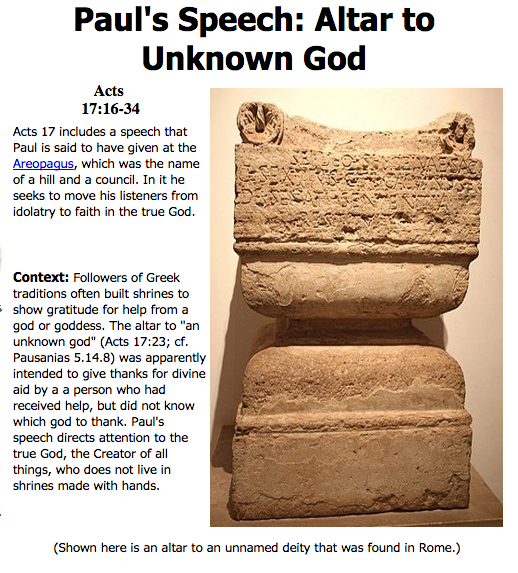[Greek] ἀγνοέω (agnoeō), [Latin] ignorare, [Latin] ignorantes, [Latin] ignoramus, [Latin] ignotus: to not know, to be ignorant, to have no knowledge, to not pay attention, to not recognize, to fail to understand, to have a willful ignorance, to lack discernment, to sing through ignorance, to have a worldly wisdom, to lack God’s wisdom, to pay no attention to; Rom.1:13, Rom. 11:25, Gal. 1:22, Mk.9:32, Lk.9:45, 1Cor. 14:38, 2Pet.2:12, Rom. 2:4, 2Cor. 2:11, Acts.17:23

Paul makes reference that the Greeks also desire to seek an Unknown God (Angostos Theos)
Background Information:
Old Testament: This term is negatively used with respect to all the nuances of the Greek concept of knowledge. This term can mean not knowing, being mistaken, being in error, being ignorant, and being unsure. In the Old Testament, this term specifically refers to both God and man. This lack understanding may translate to ignorance, rejection, and disobedience of God. The priest shall make atonement on the officer’s behalf for the error inadvertently and unknowingly committed (Lev5:18). You shall repeat this on the 7th day of the month for those who have sinned out of ignorance. Even though I have been a fool and have made a serious mistake (1 Sam.26:21). We pardon any oversight and offenses committed up to now (1 Macc. 13:39). I had known that she (Wisdom) is their leader (Wis. 7:12).
New Testament: This term continues the same Old Testament understanding of this term applying to man, God, and Jesus. This term can specifically mean to fail to understand, to ignore (pay no attention), to be unaware, and to reject. Some, by their very nature, do not understand what they do. For others, it is a willful act of rejection. The Greeks unknowingly worship an ‘Unknown God’. Sometimes, this involves general ignorance.
Scripture:
“‘Pay attention to what I am telling you. The Son of Man is to be handed over to men.’ But they did not understand this saying; its meaning was hidden from them so that they should not understand it, and they were afraid to ask Him about this saying.” Lk. 9:44-45
The disciple, in their ignorance, not only failed to understand Jesus’s statements, but failed to ask Jesus what He meant. The disciples were clearly clueless.
“I was once a blasphemer and a persecutor and an arrogant man, but I have been mercifully treated because I acted out of ignorance in my unbelief.” 1Tim.1:13
Paul, as a zealous Pharisee, led the persecution against Jesus and His disciples. The Pharisee Saul, according to his Jewish beliefs, felt justified in actions to persecute the Christians.
“For as I walked around looking carefully at your shrines, I even discovered and alter inscribed, ‘To and Unknown God.’ What therefore you unknowingly worship, I proclaim to you.” Act. 17:23
Paul appeals to the Greeks’ belief in the multiplicity of gods. Paul recognizes that the Greeks also share the human desire to seek God. Paul mentions that this God does not need to be served by human hands.
Conclusion:
Agnostic, agnosticism, ignoramus, ignorance
I am not surprised that this term would convey all the varied and nuanced ways that would illustrate the sense of not knowing. This term is necessary in understanding man’s nature and his relationship with God. This process first begins with asking these questions. The disciples are perfect illustrations of what it means to lack understanding and to be clueless. I think Paul provides the very insightful observation that even the pagan Greeks also show their unknowing desire to know God.
The Baltimore Catechism, the first catechism written for Catholics in North America, in a question and answer format, states a most profound question:
Why did God make you? God made me to know Him, to love Him, and to serve Him in this world, and to be happy with Him forever in the next.
The Latin ignoramus literally means “we are ignorant” or “we do not know.” Originally, this meant not as an insult, but just the neutral idea of lack of knowledge. I didn’t know that!
